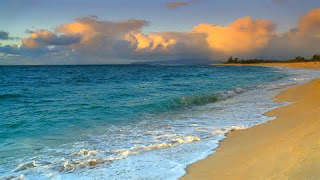I think that there is something special about any fictional scene set on a shore or beach although I cannot put my finger on exactly what: something to do with the transition from land to sea, the meeting of two environments and the possibility of embarking on or returning from a long voyage. Appropriately, there are two such scenes, both excellent, in Poul Anderson's "Star Of The Sea."
Time Patrol Specialist Jens Ulstrup has heard that Veleda had arrived by ship on the Baltic littoral five or six years previously. Everard and Floris must check out Veleda's arrival, then trace her journey back to the shore from which she had departed. Having heard Ulstrup:
"Floris...gazed past the river and the forest beyond, northeasterly toward an unseen shore." (Time Patrol, p. 570)
That unseen shore is the one on which Veleda arrived, not, as I wrongly said here, the one on which she had perceived Floris as the goddess. But Everard and Floris are cautiously working their way back toward that moment of apparent revelation. Wisely, Floris has declined Everard's suggestion that she, Floris, approach Veleda directly. Floris' reason is that Veleda has isolated herself, probably in a state of emotional or religious crisis, so that any interruption could have unpredictable effects. Indeed it would. Veleda would recognize Floris as her goddess although the Patrol agents do not know that yet.
The beach on which Everard awaits the arrival of Veleda and her companion is beautifully described with characteristic Andersonian details: sand dunes; stiff grass; haze; kelp; shells; fish- and bird-bones; darker sand under the high-water line; gulls above; cold salty wind; "...smells from the deeps..." (ibid.); incoming tide; waves hissing on the shore, booming further out; horizon becoming sky; scudding clouds; rain in the west; inland - sedge, pools, distant forest, a brook, a marsh, a hamlet.
On this beach, Everard, disguised, hopes to meet Veleda and Heidhin:
"...instead of simply tracing the ship across the water, backward through time. They dared not charge blind into what might well be the source of the instability, the obscure and easily annulled event from which an entire future could spring. Here, they hoped, was an opportunity to learn something beforehand at minimal risk." (pp. 574-575)
Of course, the obscure event will be their own arrival but they have to go there to learn that.
When a Time Patrolman travels into the past, it is always possible that he will return futureward into a different timeline. In this story alone, that possibility is described as a fork or divergence in time.
If Carl Farness, appearing at the showdown fight between his descendants and Ermanaric, had helped his descendants, then he would certainly have traveled forward into a different twentieth century. And if all Patrol agents returning from earlier times had returned into the timeline in which Odin did betray his followers, then they would never have known what Carl had done. In fact, there would be two Carls. When Everard in 1935 told Carl that he must return to 372 to betray his followers, they were in a timeline in which a version of Carl had appeared in 372 and betrayed his followers. Thus, if the Carl who traveled back after his conversation with Everard had decided to go against Everard's advice, then he would have initiated another timeline that Everard would have no knowledge of.

No comments:
Post a Comment